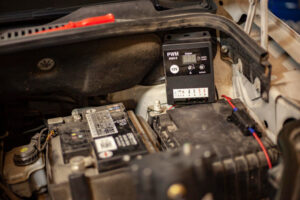That heart-sinking moment when your car won’t start leaves you wondering: is it the battery or alternator? At Trustworthy Towing Service Memphis, we’ve helped countless drivers solve this exact mystery. Our experience with Memphis drivers has taught us that knowing the difference between battery and alternator problems can save time, money, and frustration. Need immediate assistance? Call us at (901) 401-4025. Let’s dive into the key differences between these common electrical issues and learn how to identify them correctly.
Understanding Your Car’s Electrical System Basics
Your car’s electrical system works like a well-orchestrated team. The battery provides the initial power to start your vehicle and supports electrical components when the engine isn’t running. Meanwhile, the alternator takes over once the engine starts, powering your car’s electrical systems and recharging the battery.
This partnership between battery and alternator is crucial. When one component fails, it puts extra strain on the other. Understanding this relationship helps diagnose problems more accurately. The challenge lies in determining which team member isn’t pulling its weight.
Common Battery Problem Symptoms
Battery issues often announce themselves through distinct patterns. The most obvious sign is a slow, sluggish engine crank when starting your car. It might sound like “rur…rur…rur” instead of the usual quick start. This happens because the battery lacks sufficient power to turn the starter motor effectively.
Another telltale sign is when your car starts fine in the morning but struggles after short trips. This pattern suggests your battery isn’t holding a charge properly. The battery warning light might illuminate steadily, indicating a constant problem rather than fluctuating issues.
Modern batteries often include a built-in charge indicator – a small window showing green when healthy and dark or yellow when replacement is needed. Physical signs like a swollen case, corroded terminals, or a sulfuric smell also point to battery problems.
Key Alternator Problem Signs
Alternator issues present differently from battery problems. The most distinctive sign is flickering or dimming lights that change intensity as you rev the engine. Your headlights might appear brighter at higher RPMs and dimmer at idle – this happens because a failing alternator provides inconsistent power output.
Listen for unusual sounds. A failing alternator often produces a distinct whining or grinding noise due to worn bearings or internal components. You might notice your electrical accessories behaving erratically – power windows moving slower than usual or your radio randomly resetting.
A unique alternator problem indicator is when your car dies while driving. Since the alternator powers your car’s systems while running, a complete failure can shut down your engine even if your battery is healthy.
How to Test for Battery or Alternator Issues
Here’s a simple test you can perform: If your car starts with a jump but dies soon after, you’re likely dealing with an alternator problem. A healthy alternator should keep your car running even with a weak battery.
For more precise diagnosis, use a voltage meter. A healthy battery should show about 12.6 volts when the car is off. With the engine running, this should increase to 13.7-14.7 volts. If it doesn’t increase, your alternator might not be charging properly.
Professional testing equipment can provide more detailed diagnostics, especially for modern vehicles with complex electrical systems. These tools can detect subtle issues that might not be apparent through basic testing.
Preventing Future Problems
When to Call a Professional
Some electrical problems require professional diagnosis. If you notice multiple symptoms or aren’t confident in your diagnosis, it’s better to seek expert help. Modern vehicles have complex electrical systems that can be damaged by incorrect testing or repair attempts.
At Trustworthy Towing Service Memphis, we’re available 24/7 at (901) 401-4025 to help Memphis drivers with electrical system problems. Whether you need a jump start, testing, or advice about your vehicle’s electrical system, our experienced team can help identify and resolve the issue safely. We serve the entire Memphis area with reliable, professional service to keep you moving safely on the road.




